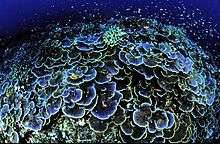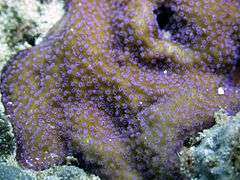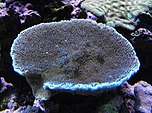Montipora
Montipora is a genus of Scleractinian corals in the phylum Cnidaria. Members of the genus Montipora may exhibit many different growth morphologies. With eighty five known species,[1] Montipora is the second most species rich coral genus after Acropora.[3]
| Montipora | |
|---|---|
 | |
| Montipora aequituberculata | |
| Scientific classification | |
| Kingdom: | Animalia |
| Phylum: | Cnidaria |
| Class: | Anthozoa |
| Order: | Scleractinia |
| Family: | Acroporidae |
| Genus: | Montipora Blainville, 1830[1][2] |
| Synonyms[1] | |
| |
Description

Growth morphologies for the genus Montipora include submassive, laminar, foliaceous, encrusting, and branching.[4][5] It is not uncommon for a single Montipora colony to display more than one growth morphology.[5] Healthy Montipora corals can be a variety of colors, including orange, brown, pink, green, blue, purple, yellow, grey, or tan.[5] Although they are typically uniform in color, some species, such as Montipora spumosa or Montipora verrucosa, may display a mottled appearance.[5]
Montipora corals have the smallest corallites of any coral family.[5] Columellae are not present.[5] Coenosteum and corallite walls are porous, which can result in elaborate structures.[5] The coenosteum of each Montipora species is different, making it useful for identification.[5] Polyps are typically only extended at night.[5]
Montipora corals are commonly mistaken for members of the genus Porites based on their visual similarities, however, Porites can be distinguished from Montipora by examining the structure of the corallites.[5]
Distribution
Montipora corals are common on reefs and lagoons of the Red Sea, the western Indian Ocean and the southern Pacific Ocean, but are entirely absent in the Atlantic Ocean.[4]
Ecology
Montipora corals are hermaphroditic broadcast spawners.[6] Spawning typically happens in spring.[6] The eggs of Montipora corals already contain zooxanthellae, so none is obtained from the environment.[6][7] This process is known as direct or vertical transmission.[3]
Montipora corals are preyed upon by corallivorous fish, such as butterflyfish.[8] Montipora corals are known to host endo- and ectoparasites such as Allopodion mirum and Xarifia extensa.[1] A currently undescribed species of nudibranch in the genus Phestilla has also been reported in the scientific and aquarium hobbyist literature to feed on the genus [9].
Montipora corals are susceptible to the same stresses as other Scleractinian corals, such as anthropogenic pollution, sediment, algal growth, and other competitive organisms.[6]
Evolutionary history
A 2007 study found that the genus Montipora formed a strongly supported clade with Anacropora, making it the genus with the closest genetic relationship to Montipora.[10] It is thought that Anacropora evolved from Montipora relatively recently.[7]
Gallery
 Montipora capricornis
Montipora capricornis Polyps of Montipora aequituberculata
Polyps of Montipora aequituberculata Montipora aequituberculata colonies near Ningaloo Reef
Montipora aequituberculata colonies near Ningaloo Reef Montipora caliculata
Montipora caliculata Branching colony of Montipora capitata in Hawaii
Branching colony of Montipora capitata in Hawaii Encrusting colony of Montipora capitata
Encrusting colony of Montipora capitata Polyps of Montipora danae
Polyps of Montipora danae Montipora ehrenbergii
Montipora ehrenbergii
 Montipora hispida
Montipora hispida Polyps of Montipora hispida
Polyps of Montipora hispida Polyps of Montipora monasteriata
Polyps of Montipora monasteriata Montipora nodosa
Montipora nodosa Montipora tuberculosa
Montipora tuberculosa Montipora verrucosa at Birch Aquarium in San Diego, CA
Montipora verrucosa at Birch Aquarium in San Diego, CA
Species
- Montipora aequituberculata Bernard, 1897
- Montipora altasepta Nemenzo, 1967
- Montipora angulata Lamarck, 1816
- Montipora aspergillus Veron, DeVantier & Turak, 2000
- Montipora australiensis Bernard, 1897
- Montipora biformis Nemenzo, 1988
- Montipora cactus Bernard, 1897
- Montipora calcarea Bernard, 1897
- Montipora calculata Dana, 1846
- Montipora capitata Dana, 1846
- Montipora capricornis Veron, 1985
- Montipora cebuensis Nemenzo, 1976
- Montipora circumvallata Ehrenberg, 1834
- Montipora cocosensis Vaughan, 1918
- Montipora confusa Nemenzo, 1967
- Montipora conspicua Nemenzo, 1979
- Montipora contorta Nemenzo & Montecillo, 1981
- Montipora corbettensis Veron & Wallace, 1984
- Montipora crassituberculata Bernard, 1897
- Montipora cryptus Veron, 2000
- Montipora danae Milne Edwards & Haime, 1851
- Montipora delicatula Veron, 2000
- Montipora digitata Dana, 1846
- Montipora dilatata Studer, 1901
- Montipora echinata Veron, DeVantier & Turak, 2000
- Montipora edwardsi Bernard, 1897
- Montipora efflorescens Bernard, 1897
- Montipora effusa Dana, 1846
- Montipora ehrenbergi Verrill, 1872
- Montipora explanata Brüggemann, 1879
- Montipora flabellata Studer, 1901
- Montipora florida Nemenzo, 1967
- Montipora floweri Wells, 1954
- Montipora foliosa Pallas, 1766
- Montipora foveolata Dana, 1846
- Montipora friabilis Bernard, 1897
- Montipora gaimardi Bernard, 1897
- Montipora gracilis Klunzinger, 1879
- Montipora grisea Bernard, 1897
- Montipora hemispherica Veron, 2000
- Montipora hirsuta Nemenzo, 1967
- Montipora hispida Dana, 1846
- Montipora hodgsoni Veron, 2000
- Montipora hoffmeisteri Wells, 1954
- Montipora incrassata Dana, 1846
- Montipora informis Bernard, 1897
- Montipora kellyi Veron, 2000
- Montipora lobulata Bernard, 1897
- Montipora mactanensis Nemenzo, 1979
- Montipora malampaya Nemenzo, 1967
- Montipora maldivensis Pillai & Scheer, 1976
- Montipora manauliensis Pillai, 1967
- Montipora meandrina Ehrenberg, 1834
- Montipora millepora Crossland, 1952
- Montipora mollis Bernard, 1897
- Montipora monasteriata Forskåi, 1775
- Montipora niugini Veron, 2000
- Montipora nodosa Dana, 1846
- Montipora orientalis Nemenzo, 1967
- Montipora pachytuberculata Veron, DeVantier & Turak
- Montipora palawanensis Veron, 2000
- Montipora patula Verrill, 1870
- Montipora peltiformis Bernard, 1897
- Montipora porites Veron, 2000
- Montipora samarensis Nemenzo, 1967
- Montipora saudii Veron, DeVantier & Turak
- Montipora setosa Nemenzo, 1976
- Montipora sinuosa Pillai & Scheer, 1976
- Montipora spongiosa Ehrenberg, 1834
- Montipora spongodes Bernard, 1897
- Montipora spumosa Lamarck, 1816
- Montipora stellata Bernard, 1897
- Montipora stilosa
- Montipora suvadivae Pillai & Scheer, 1976
- Montipora taiwanensis Veron, 2000
- Montipora tortuosa Dana, 1846
- Montipora tuberculosa Lamarck, 1816
- Montipora turgescens Bernard, 1897
- Montipora turtlensis Veron & Wallace, 1984
- Montipora undata Bernard, 1897
- Montipora venosa Ehrenberg, 1834
- Montipora verrilli Vaughan, 1907
- Montipora verrucosa Lamarck, 1816
- Montipora verruculosa Veron, 2000
- Montipora vietnamensis Veron, 2000
References
- World Register of Marine Species link: Montipora Blainville, 1830 (+species list)
- "Montipora". Integrated Taxonomic Information System.
- van Oppen, Madeleine J.H. (2004). "Mode of zooxanthella transmission does not affect zooxanthella diversity in acroporid corals". Marine Biology. 144: 1–7. doi:10.1007/s00227-003-1187-4.
- Van Oppen, M.J.H; Koolmees, E.M.; J.E.N, Veron (2004). "Patterns of evolution in the scleractinian coral genus Montipora (Acrroporidae)". Marine Biology. 144: 9–18. doi:10.1007/s00227-003-1188-3.
- Veron, J.E.N (1986). Corals of Australia and the Indo-Pacific. London: Angus & Robertson Publishers. pp. 92–121.
- Richmond, Robert (1997). Reproduction and Recruitment in Corals. pp. 175–197.
- Fukami, Hironobu; Omari, Makoto; Hatta, Masayuki (2000). "Phylogenetic relationships in the coral family Acroporidae, reassessed by inference from mitochondrial genes". Zoological Science. 17 (5): 689–696. doi:10.2108/zsj.17.689. PMID 18517306.
- Berumen, Michael; Pratchett, Morgan S. (2006). "Recovery without resilience: persistent disturbance and long-term shifts in the structure of fish and coral communities at Tiahura reef, Moorea". Coral Reefs. 25 (4): 647–653. doi:10.1007/s00338-006-0145-2.
- Fritts-Penniman, Allison Louise (2016). "Ecological Speciation and Cryptic Diversity of Coral-Associated Nudibranchs". UCLA. Retrieved 21 June 2019.
- Wallace, C.C; et al. (2007). "Recognition of separate genera within Acropora based on new morphological, reproductive, and genetic evidence from Acropora togianensis, and elevation of the subgenus Isopora Studer, 1878 to genus (Scleractinia: Astrocoeniidae; Acroporidae)". Coral Reefs. 26 (2): 231–239. doi:10.1007/s00338-007-0203-4.
| Wikimedia Commons has media related to Montipora. |
| Wikispecies has information related to Montipora |
| Marine Life Wikiproject |